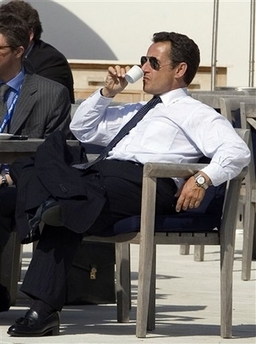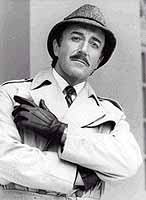 French President Nicolas Sarkozy went to Tripoli on Wednesday and struck a number of deals with Libyan leader Moammar Gadhafi, including promises to build a nuclear reactor. Now critics in Germany and France are crying foul, accusing him of going it alone and potentially endangering Europe.
French President Nicolas Sarkozy went to Tripoli on Wednesday and struck a number of deals with Libyan leader Moammar Gadhafi, including promises to build a nuclear reactor. Now critics in Germany and France are crying foul, accusing him of going it alone and potentially endangering Europe.New French President Nicolas Sarkozy is really starting to grate on German nerves. First he tried to shake up the European Central Bank, then he let his wife grab the limelight over the release of the six Bulgarian medics held in Libya for eight years and now he is going it alone to clinch important deals with Libyan leader Moammar Gadhafi.
Sarkozy traveled to Tripoli on Wednesday just a day after his wife Cecilia flew out of Libya on a French presidential plane with the five Bulgarian nurses and one Palestinian doctor on board. The French president and Gadhafi signed five key agreements on future cooperation, including deals on defense and civilian nuclear energy.
The French even agreed to help the Libyans develop a nuclear reactor to desalinate water. But critics in Germany and France have questioned the wisdom of promoting atomic energy in a country that until 2003 had been trying to develop a nuclear weapons program. The Libyan leader has since renounced terrorism and signed the Nuclear Non-Proliferation Treaty, but many German commentators and politicians argue that the country is still a dictatorship and so its promises should be viewed with caution.
Gernot Erler, a junior minister with the Social Democrats in Germany's Foreign Ministry, described the deal as politically "problematic." Speaking to business daily Handelsblatt on Friday, he accused Paris of acting against Germany's interests. The nuclear deal involves a subsidiary of the French nuclear firm Areva, which is 34 percent owned by Germany's Siemens. He said that since the export of nuclear technology could affect European security, there should be consultation between the German and French governments.
And the chairman of the German parliament's foreign affairs committee, Ruprecht Polenz, warned Sarkozy against weakening Europe with his solo activities. "In foreign policy there should be agreement with European partners," he told Reuters Friday. "Even if it takes time, France should act to strengthen the common European foreign and security policies." Polenz, a member of Chancellor Angela Merkel's Christian Democrats, said that in his opinion Libya was not stable and did not respect human rights. He agreed that the country should be helped to rejoin the international community -- "but not with nuclear reactors."
The head of Germany's Green Party, Reinhard Bütikofer, slammed the deal in more outspoken terms. Speaking to the Passau Neue Presse newspaper on Friday, he accused Sarkozy of "reckless and nationalistic" behavior, and questioned whether one should trust a dictator's word even if he had renounced nuclear weapons.
Sarkozy's Libyan adventure was not universally applauded back home in France either. Environmentalists and left-wing opponents voiced anger at the nuclear agreement. Daniel Cohn-Bendit of the Green Party called the deal a "ransom" for the Bulgarian nurses. "France negotiated and has delivered a nuclear power plant," he told RTL radio -- a charge the government in Paris vehemently denies.
Environmental campaigning group Greenpeace described the deal as "irresponsible." "This deal poses enormous problems of nuclear proliferation and is a clear continuation of the French policy of irresponsibly exporting its nuclear technology, " it said in a statement on Thursday.
French anti-nuclear group Sortir du Nucleaire accused Sarkozy of handing over nuclear technology to Libya in exchange for the nurses. "Civilian and military nuclear are inseparable," the group said in a statement on Thursday. "Delivering 'civilian' nuclear energy to Libya would amount to helping the country, sooner or later, to acquire nuclear weapons."
Leading French daily Le Monde wrote that the "haste" with which Sarkozy rushed to Libya left a "bitter aftertaste." "Sarkozy wanted to introduce morality into foreign policy," it wrote. "The case of Libya, at least, is an example of the very opposite."
The German press on Friday is overwhelmingly negative about the French president's Libyan jaunt. While some newspapers mull what this means for European security and for Sarkozy's idea of a "Mediterranean Union," others ponder if this is the end of any hope for a common European policy on human rights.
The business daily Handelsblatt writes:
"One doesn't necessarily have to share Sarkozy's euphoria when he says that nuclear power is the energy of the future, even in Africa. But no one can forbid this kind of business. Especially as Libya is legally allowed to use nuclear power for civilian purposes. Tripoli has signed the Non-Proliferation Treaty and is therefore committed to accepting inspections by the International Atomic Energy Authority."
"But signing contracts is one thing, adhering to them is quite another. Iran and North Korea are prime examples. And that is why Sarkozy must be kept to his word: He has arranged the deal with Gadhafi, trusting him, as he says, to deal responsibly with the explosive material. That means it is his duty to prevent the emergence of a second Iran in North Africa."
The center-left Süddeutsche Zeitung writes:
"Sarkozy's appearance on the Libyan blackmail stage was anything but a diplomatic masterstroke. The fact that he sealed a nuclear deal with Gadhafi is part of the French tradition of selling nuclear reactors throughout the world. But the fact that Libya is still a dictatorship speaks against such a deal, even if the country has signed the Nuclear Non-Proliferation Treaty. It is, however, certainly legitimate for the leader of a nation that has traditional ties with North Africa to cultivate them further -- in consultation with the rest of Europe."
"But his pushing to the front of the queue in the hostage affair shows a lack of tact. Craving for attention, the Sarkozys played to the crowd, after other EU politicians had spent a long time quietly negotiating the conditions for Libya to open its prison gates. The whole thing was just embarrassing."
The conservative daily Die Welt writes:
"Gadhafi remains an unscrupulous despot in his economically underdeveloped country. But neither Gadhafi's agenda nor the EU's dispute with Iran seem to bother French President Nicolas Sarkozy ... he wants to position himself as a European -- if not world -- leader."
"Gadhafi is perfect for a number of reasons: Libya can offer France oil and contracts worth billions for the French nuclear industry. And Sarkozy can revive his favourite topic of a Mediterranean Union, which would now include Libya. By building a bridge across the Mediterranean, Sarkozy is attempting to avert France's loss of importance in an enlarged European Union that has moved to the east. The Mediterranean Union that Sarkozy envisages would also include Turkey, which would then not be an EU member. And post-colonial France would also be able to win more power in the Mediterranean."
"But with this combination of nationalist, geo-strategic and private interests, Sarozky is not doing France, the EU or the Mediterranean Union any favors. The idea of bringing those nations who are fascinated with Europe -- but whose entry is still almost impossible -- closer to the EU is basically sensible. But Sarkozy's tactics could end up casting the whole idea in a negative light."
The left-wing Die Tageszeitung -- whose front cover Friday shows a photograph of Gadhafi under the headline "Would You Sell This Man a Nuclear Power Plant?" -- writes:
"If the EU ever had anything that could be called a credible human rights policy, then we can definitely wave goodbye to it now. Because Sarkozy's Libya trip and his nuclear and military deals are not just the embarrassing sequel to the farce called 'How the Sarkozys Saved the Bulgarian Nurses.' It is a European disgrace."
"Libya is still a dictatorship, where no opposition or freedom of opinion is permitted. That alone should be enough to keep economic relations down to a minimum."
"Obviously all European decision-makers care about is not being left behind in the global fight for natural resources, markets and spheres of influence. Human rights abuses are somewhat troubling, but President Sarkozy has just displayed the ease with which the threshold can be lowered."
The left-leaning Berliner Zeitung writes:
"The humanitarian women's program in Tripoli was followed by the appearance of two very masculine men. With puffed-out chests, steady strides and serious faces, Libyan leader Moammar Gadhafi and French President Nicolas Sarkozy played the role of important politicians. France was including Libya in the circle of respectable nations, for all the world to see, helping the reformed rogue to rearm and promising him a nuclear reactor."
"For its part, Libya is supposed to keep the flood of migrants away from Europe, or at least control them better, and to fight terrorism, an area with which Gadhafi is only too familiar. To everyone's delight, access is now open to Libya's oil supplies."
"Yesterday's enemy is today's friend. Gadhafi has pledged to abandon terrorism. But can this man who loves dodging and weaving be trusted? The negotiations on the release of the Bulgarian nurses inspired mistrust more than anything else. There is nothing wrong with trading with Libya, normalizing relations and doing everything possible to make the country more open. But nuclear reactors and weapons are hardly suitable at this stage of the game."
-- Siobhán Dowling

 The U.N. nuclear watchdog welcomed a landmark civil nuclear deal between India and the United States on Thursday, saying it would end New Delhi's nuclear isolation and spur global non-proliferation efforts.
The U.N. nuclear watchdog welcomed a landmark civil nuclear deal between India and the United States on Thursday, saying it would end New Delhi's nuclear isolation and spur global non-proliferation efforts.  Any sanctions imposed on Iran over its nuclear programme would not target the Iranian people, the Bush administration said on Thursday in a scathing attack on the Islamic republicâs leadership. Condoleezza Rice, US secretary of state, gave assurances that scholars, musicians and athletes â a reference to Iranâs World Cup soccer team â would not be penalised, as the US joined the three leading European powers in announcing their determination to refer Tehran to the United Nations Security Council over its plan to begin uranium enrichment. Ms Rice would not be drawn on what kind of UN sanctions the US was considering. There was a âmenu of possibilitiesâ, she told reporters in Washington.
Any sanctions imposed on Iran over its nuclear programme would not target the Iranian people, the Bush administration said on Thursday in a scathing attack on the Islamic republicâs leadership. Condoleezza Rice, US secretary of state, gave assurances that scholars, musicians and athletes â a reference to Iranâs World Cup soccer team â would not be penalised, as the US joined the three leading European powers in announcing their determination to refer Tehran to the United Nations Security Council over its plan to begin uranium enrichment. Ms Rice would not be drawn on what kind of UN sanctions the US was considering. There was a âmenu of possibilitiesâ, she told reporters in Washington.